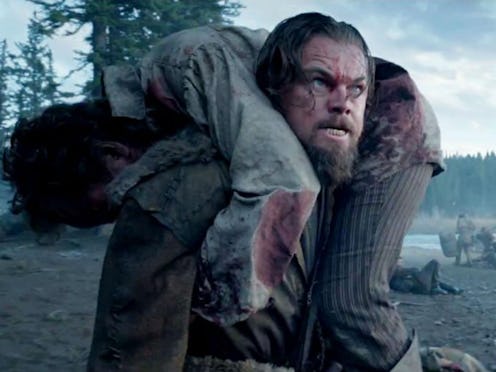
I've never been an outdoors-y kind of person. But if I had been at any point, I firmly believe that just seeing the trailer for Leonardo DiCaprio's adventure flick The Revenant would have me reconsidering that lifestyle. DiCaprio stars as Hugh Glass, a frontiersman and fur trapper on a group expedition in 1823. Glass is brutally mauled by a bear and then robbed and deserted by the rest of his party. The film follows Glass as he battles a punishing winter in uncharted American territories, driven by a savage need to find and confront those who left him to his death. Fine family fun, right? After hearing the true story behind The Revenant , I'm not even down to go camping in someone's suburban backyard.
Hugh Glass is a real person, and The Revenant is based loosely on a Missouri River expedition organized by General William Henry Ashley in 1822. (He placed an ad calling for "Enterprising Young Men.") The trailer proudly declares that The Revenant is "based on true events," and it's not the only piece of art or even the only film to dramatize or simply recount Glass's incredible life. Richard Harris and John Huston starred in 1971's Man In The Wilderness, which applies the tagline "The savagery of nature against the will of one man" to Glass and his miraculous survival. In print, Glass shows up in both biographies and historical novels that embellish the already unbelievable tale. He even makes an appearance in an Of Monsters And Men song, proving that the band's Americana obsession is the real business, and not just an affectation.
Glass himself was born in Pennsylvania, but became a real-life folk hero when he made his way to the wilderness of the American West. Many specific details of his life have been handed down through stories and not through public or private records, so they're difficult to corroborate. Prior to the infamous expedition and attack, Glass may have lived among a Pawnee tribe in Texas, marrying a Pawnee woman and meeting with the US government on the tribe's behalf. Another piece of oral history maintains that he was captured and forced into privateering for two full years before swimming to his freedom on the shores of Texas. The 1915 epic poem "The Song Of Hugh Glass" by John Neihardt opens with a description of the man that sounds like something straight out of an American tall tale:
Deep-chested, that his great heart might have play, Gray-bearded, gray of eye and crowned with gray Was Glass.
(That screams DiCaprio, right?)
But it was Glass's run-in with the grizzly and subsequent survival that captured the imaginations of poets, songwriters, authors, and, of course, filmmakers. A 1922 article about the attack in The Milwaukee Journal posits that Glass's story "has survived in the annuls of the fur days because of the amazing facts involved in it that have to do with treachery and a man's grim fight to live to be revenged." In short, humans are interested in betrayal and in responses to it. (Think every soap opera ever, How To Get Away With Murder, 9/10 Taylor Swift songs, etc...) Would Glass have pulled through that winter without a fiery desire for revenge burning inside him? "The human spirit" is usually credited in miraculous survival stories, and maybe the dark side of that spirit deserves just as much credit as the light.
Hugh Glass is a real life folk hero with a serious edge, and Leonardo DiCaprio and The Revenant will bring his story to a new generation.
Image: 20th Century Fox